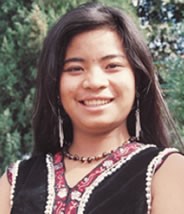Lawa in China

Photo Source:
Copyrighted © 2026
Operation China, Asia Harvest All rights reserved. Used with permission |
Send Joshua Project a map of this people group.
|
| People Name: | Lawa |
| Country: | China |
| 10/40 Window: | Yes |
| Population: | 106,000 |
| World Population: | 106,000 |
| Primary Language: | Awa (China) |
| Primary Religion: | Buddhism |
| Christian Adherents: | 20.00 % |
| Evangelicals: | 18.00 % |
| Scripture: | Portions |
| Ministry Resources: | No |
| Jesus Film: | Yes |
| Audio Recordings: | No |
| People Cluster: | Mon-Khmer |
| Affinity Bloc: | Southeast Asian Peoples |
| Progress Level: |
|
Introduction / History
The Lawa were also known historically as the Tame Wa. They assimilated more quickly to the cultures of surrounding peoples than did the Kawa, or Wild Wa, who live in isolated communities at least 1,500 meters (5,000 ft.) up in the mountains.
The Lawa language in China is not intelligible with Lawa spoken in Thailand, which has "surprisingly great dialect differences." Despite their relatively small population, the Christian ministry Global Recordings has produced cassettes in seven different Lawa dialects in Thailand alone. The Lawa now use a Roman script, but in the past they communicated by engraving bamboo strips or sending objects to other villages. "Objects used implied specific meaning or feelings. For instance, sugarcane, banana or salt meant friendship, but pepper meant anger, feathers urgency, and gunpowder and bullets the intention of clan warfare."
What Are Their Lives Like?
Having adopted Theravada Buddhism under the influence of the Tais many centuries ago, the Lawa became a more gentle people than their headhunting cousins in the mountains. The Lawa's Buddhism is cloaked with traditional animistic and polytheistic rituals, as well as with ancestor worship.
What Are Their Beliefs?
In addition to their adherence to Buddhism, the Lawa believe in "house spirits, local spirits, and the spirits of the iron mines. They also rely heavily on witchdoctors. Many deities are regarded as disembodied spirits of ancient heroes." Christian churches are also found in many Lawa villages in China.
Lawa Christians in China first received the gospel in the 1920s from William Young of the American Baptist Foreign Mission Society and later from his two sons: "Young succeeded against all odds to win the crude Wa tribe to Christianity." The Lawa's conversion was attained not only by preaching and words but by Young's self-sacrificial concern for the people. Historian T'ien Ju-K'ang recorded: "At the onset he was fiercely opposed by the Wa who threatened to cut off his head if he ever dared to approach their settlement again. Once in 1924, Young discovered the body of a dying woman lying in a ditch outside a village. She was apparently a victim of smallpox who had been left for dead. Young immediately erected a shed and brought in the woman for treatment, washing her sores continuously for three days. To draw out the puss, Young did not hesitate to use his own mouth. His devotion and compassion opened the hearts of countless Wa to receive his message."
What Are Their Needs?
The Lawas have a strong church today. They need to spread the fragrance of Christ to others who lack a gospel witness.
Prayer Points
Pray for revival fire to move in Lawa churches, driving them to love and good works.
Pray for a thousand Lawa disciples to make disciples of others.
Pray for the Lord to bless the Lawa families physically and spiritually.
Pray for the authority of Christ to bind hindering spiritual forces to lead them from darkness to light.